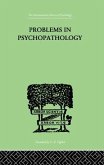Daniel C. Marston, Margaret Gopaul, Terry Maple
Comparative Psychopathology
Connecting Comparative and Clinical Psychology
Daniel C. Marston, Margaret Gopaul, Terry Maple
Comparative Psychopathology
Connecting Comparative and Clinical Psychology
- Broschiertes Buch
- Merkliste
- Auf die Merkliste
- Bewerten Bewerten
- Teilen
- Produkt teilen
- Produkterinnerung
- Produkterinnerung
By reading this text, readers will find essential information about how incorporating comparative psychology into understanding psychopathology can make that understanding stronger and how this approach can help psychology can help make for a truly better and just world.
Andere Kunden interessierten sich auch für
![Personality and Psychopathology Personality and Psychopathology]() Personality and Psychopathology39,99 €
Personality and Psychopathology39,99 €![Influye En La Conducta Humana Influye En La Conducta Humana]() Leticia CaballeroInfluye En La Conducta Humana29,99 €
Leticia CaballeroInfluye En La Conducta Humana29,99 €![Problems in Psychopathology Problems in Psychopathology]() T W MitchellProblems in Psychopathology25,99 €
T W MitchellProblems in Psychopathology25,99 €![The Cambridge Handbook of Cyber Behavior 2 Volume Paperback Set The Cambridge Handbook of Cyber Behavior 2 Volume Paperback Set]() The Cambridge Handbook of Cyber Behavior 2 Volume Paperback Set144,99 €
The Cambridge Handbook of Cyber Behavior 2 Volume Paperback Set144,99 €![Interbehaviorism Interbehaviorism]() Linda J HayesInterbehaviorism64,99 €
Linda J HayesInterbehaviorism64,99 €![By Reason of Insanity By Reason of Insanity]() Richard R. SternbergBy Reason of Insanity28,99 €
Richard R. SternbergBy Reason of Insanity28,99 €![Mental Health and Psychopathology Mental Health and Psychopathology]() Mental Health and Psychopathology56,99 €
Mental Health and Psychopathology56,99 €-
-
-
By reading this text, readers will find essential information about how incorporating comparative psychology into understanding psychopathology can make that understanding stronger and how this approach can help psychology can help make for a truly better and just world.
Produktdetails
- Produktdetails
- Verlag: Taylor & Francis Ltd
- Seitenzahl: 208
- Erscheinungstermin: 20. September 2024
- Abmessung: 229mm x 152mm
- ISBN-13: 9781032503714
- ISBN-10: 1032503718
- Artikelnr.: 70362292
- Verlag: Taylor & Francis Ltd
- Seitenzahl: 208
- Erscheinungstermin: 20. September 2024
- Abmessung: 229mm x 152mm
- ISBN-13: 9781032503714
- ISBN-10: 1032503718
- Artikelnr.: 70362292
Terry Maple, Ph.D.,is an American behavioral research scientist, wildlife conservationist, Professor Emeritus (Georgia Institute of Technology), and zoo director emeritus. He was Director and later President and CEO of Zoo Atlanta. Dr. Maple has mentored 29 doctoral students at Emory University and Georgia Tech and written over 250 journal articles, chapters, and books on the behavior, conservation, and welfare of animals. Daniel Marston, Ph.D., ABPP, is a licensed clinical psychologist specializing in behavior therapy in the states of Pennsylvania and Ohio in the United States. He has two previous books and several articles published on the intersection of clinical psychology and behavior research. He also teaches statistics and research design in the Doctor of Education program at Liberty University. Margaret Gopaul, Ph.D., MSCP, is a research scientist and professor holding a Ph.D. in clinical psychology with a specialization in neuropsychology, a post-doctorate in clinical psychopharmacology, and neurophysiology training in epilepsy from Yale University and the University of Connecticut (surgical neurophysiology). She is a research faculty at Yale University/School of Medicine (Neurology) and serves as an associate research scientist at the Yale Comprehensive Epilepsy Center, and the Veterans Affairs Medical Center (Neurology).
PREFACE by Margaret GoPaul, PhD, MSCP
INTRODUCTION: WHY WE WROTE THIS BOOK
CHAPTER 1: DEFINITION: PSYCHOPATHOLOGY FROM A COMPARATIVE PSYCHOLOGY
PERSPECTIVE
CHAPTER 2: COMPARATIVE PSYCHOPATHOLOGY AND DIAGNOSTIC SYSTEMS
CHAPTER 3: SOCIAL COMPETITION THEORY AND CLINICAL DEPRESSION
CHAPTER 4: BEYOND THE BASICS OF ANXIETY DISORDER: A COMPARATIVE
PSYCHOPATHOLOGY PERSPECTIVE
CHAPTER 5: COMPARATIVE PSYCHOPATHOLOGY AND REPETITIVE BEHAVIORS
CHAPTER 6: COMPARATIVE PSYCHOPATHOLOGY AND DEMENTIA
CHAPTER 7: ETHOLOGICAL RESEARCH AS AN ALTERNATIVE TO EXPERIMENTATION
CHAPTER 8: ZOOS AS COMPARATIVE PSYCHOPATHOLOGY LABORATORIES
CHAPTER 9: AGGRESSION AND COMPARATIVE PSYCHOPATHOLOGY
CHAPTER 10: DEPRIVATION-INDUCED PSYCHOPATHOLOGY
INTRODUCTION: WHY WE WROTE THIS BOOK
CHAPTER 1: DEFINITION: PSYCHOPATHOLOGY FROM A COMPARATIVE PSYCHOLOGY
PERSPECTIVE
CHAPTER 2: COMPARATIVE PSYCHOPATHOLOGY AND DIAGNOSTIC SYSTEMS
CHAPTER 3: SOCIAL COMPETITION THEORY AND CLINICAL DEPRESSION
CHAPTER 4: BEYOND THE BASICS OF ANXIETY DISORDER: A COMPARATIVE
PSYCHOPATHOLOGY PERSPECTIVE
CHAPTER 5: COMPARATIVE PSYCHOPATHOLOGY AND REPETITIVE BEHAVIORS
CHAPTER 6: COMPARATIVE PSYCHOPATHOLOGY AND DEMENTIA
CHAPTER 7: ETHOLOGICAL RESEARCH AS AN ALTERNATIVE TO EXPERIMENTATION
CHAPTER 8: ZOOS AS COMPARATIVE PSYCHOPATHOLOGY LABORATORIES
CHAPTER 9: AGGRESSION AND COMPARATIVE PSYCHOPATHOLOGY
CHAPTER 10: DEPRIVATION-INDUCED PSYCHOPATHOLOGY
PREFACE by Margaret GoPaul, PhD, MSCP
INTRODUCTION: WHY WE WROTE THIS BOOK
CHAPTER 1: DEFINITION: PSYCHOPATHOLOGY FROM A COMPARATIVE PSYCHOLOGY
PERSPECTIVE
CHAPTER 2: COMPARATIVE PSYCHOPATHOLOGY AND DIAGNOSTIC SYSTEMS
CHAPTER 3: SOCIAL COMPETITION THEORY AND CLINICAL DEPRESSION
CHAPTER 4: BEYOND THE BASICS OF ANXIETY DISORDER: A COMPARATIVE
PSYCHOPATHOLOGY PERSPECTIVE
CHAPTER 5: COMPARATIVE PSYCHOPATHOLOGY AND REPETITIVE BEHAVIORS
CHAPTER 6: COMPARATIVE PSYCHOPATHOLOGY AND DEMENTIA
CHAPTER 7: ETHOLOGICAL RESEARCH AS AN ALTERNATIVE TO EXPERIMENTATION
CHAPTER 8: ZOOS AS COMPARATIVE PSYCHOPATHOLOGY LABORATORIES
CHAPTER 9: AGGRESSION AND COMPARATIVE PSYCHOPATHOLOGY
CHAPTER 10: DEPRIVATION-INDUCED PSYCHOPATHOLOGY
INTRODUCTION: WHY WE WROTE THIS BOOK
CHAPTER 1: DEFINITION: PSYCHOPATHOLOGY FROM A COMPARATIVE PSYCHOLOGY
PERSPECTIVE
CHAPTER 2: COMPARATIVE PSYCHOPATHOLOGY AND DIAGNOSTIC SYSTEMS
CHAPTER 3: SOCIAL COMPETITION THEORY AND CLINICAL DEPRESSION
CHAPTER 4: BEYOND THE BASICS OF ANXIETY DISORDER: A COMPARATIVE
PSYCHOPATHOLOGY PERSPECTIVE
CHAPTER 5: COMPARATIVE PSYCHOPATHOLOGY AND REPETITIVE BEHAVIORS
CHAPTER 6: COMPARATIVE PSYCHOPATHOLOGY AND DEMENTIA
CHAPTER 7: ETHOLOGICAL RESEARCH AS AN ALTERNATIVE TO EXPERIMENTATION
CHAPTER 8: ZOOS AS COMPARATIVE PSYCHOPATHOLOGY LABORATORIES
CHAPTER 9: AGGRESSION AND COMPARATIVE PSYCHOPATHOLOGY
CHAPTER 10: DEPRIVATION-INDUCED PSYCHOPATHOLOGY








